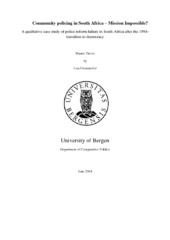Community Policing in South Africa - Mission impossible? A qualitative case study of police reform failure in South Africa after the 1994-transition to democracy
Master thesis
Permanent lenke
https://hdl.handle.net/1956/8290Utgivelsesdato
2014-06-02Metadata
Vis full innførselSamlinger
Sammendrag
Since the 1990s community policing has been promoted as an ideal and pursued though policing reforms in large parts of the developing world, especially in post-transitional societies faced with the twin problem of high crime and lack of legitimacy for the police. Despite high expectations the results have not been encouraging, and attempts to implement community policing reforms have often been deemed as failures. This also holds true South Africa, and in many ways South Africa represents a typical case of contexts where community policing reform has been advocated as a solution. At the same time it represents a case where extensive and long-term efforts to change the policing practices in line with these ideals have been made. An inquiry into reform processes and the potential causes of police reform failure in the South African case may therefore generate an overall more refined understanding of casual mechanisms causing such reforms to fail. In order to explain community police failure I have compared and tested three theoretical strands presented in the scholarly literature regarding causal relationships causing the police reform to fail. The aim has been to find a theoretical narrative best suited to explain the South African case. Findings are twofold; firstly the success or failure of police reform is affected by a wide set of contextual conditions and to find one single cause or theoretical narrative for explaining it therefore seem inappropriate. However, this study indicates that a part of the narrative for explaining police reform failure in South Africa should be ascribed to the police reform, being a bad fit in the meeting with challenging contextual pre-conditions. Secondly, findings from the South African case indicate that it may be premature to deem the reforms to total failure as initially suggested by the scholarly literature. This thesis concludes that when community policing reforms are undertaken under such challenging circumstances as those often existing in post-transitional societies - they will, at best, need more time to become effective.
